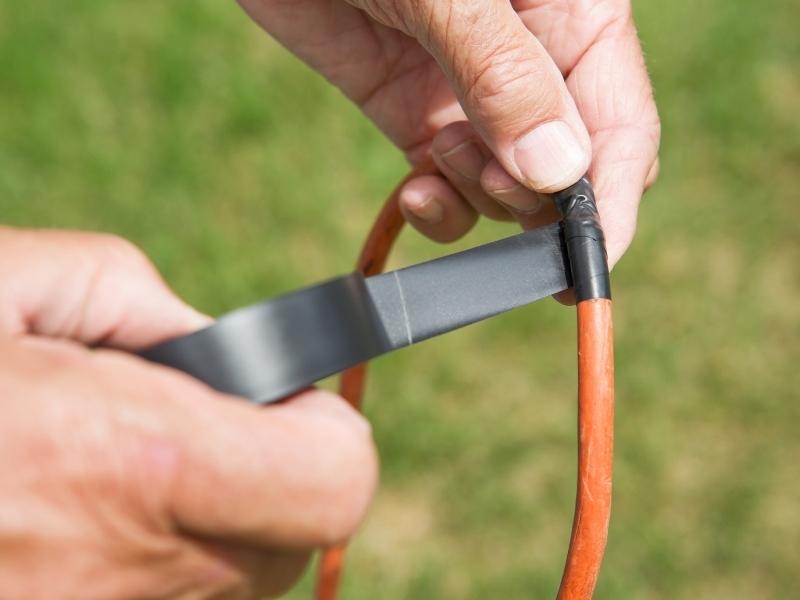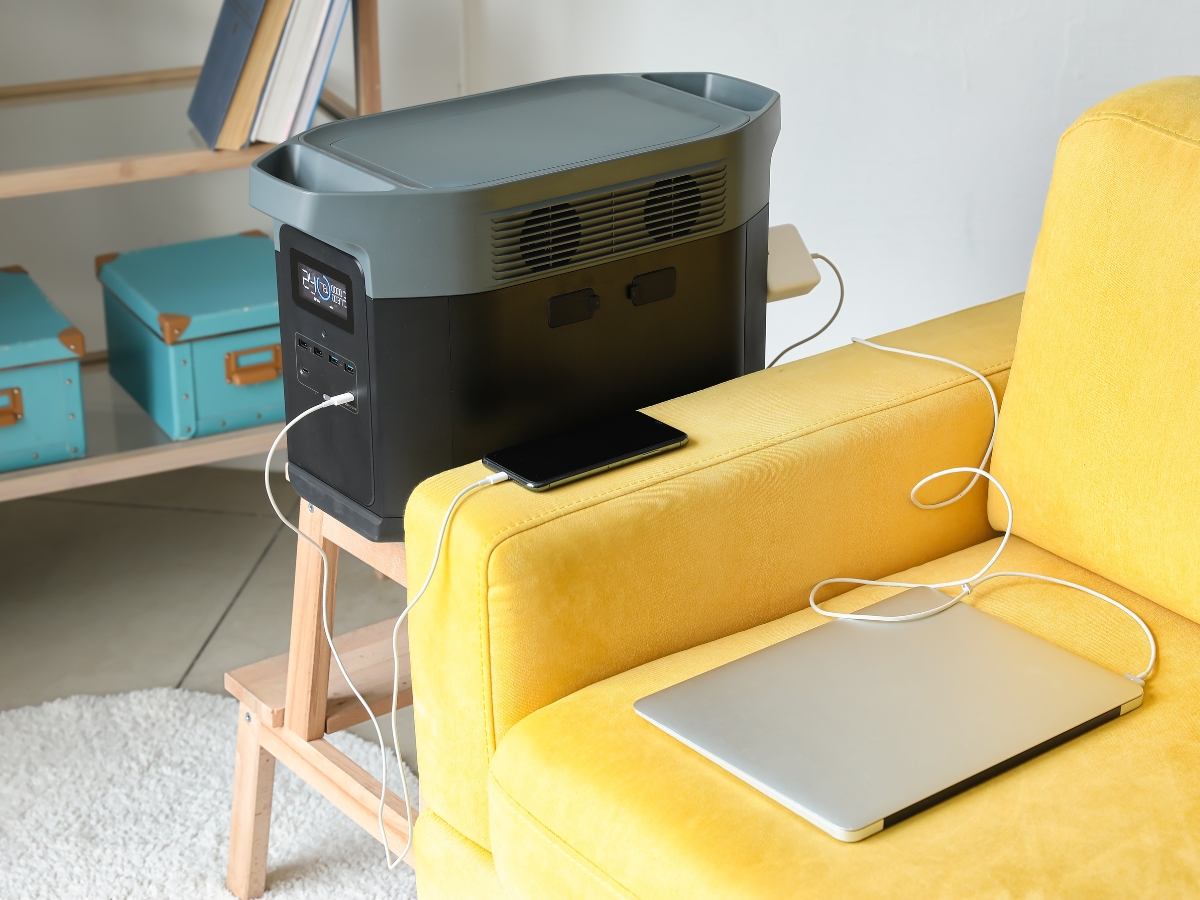As it is commonly known, electrical tape or insulation tape is widely used by professional electricians and DIY users alike. It is extremely useful and has proved its worth and value over the years.
Electrical tape is not waterproof, although it is water-resistant. It should therefore not be used where there is any risk of contact with excessive water that may find its way into the connection and potentially create as short or risk of electrocution.
Let’s look at some key points around electrical tape :
- Why most electrical tape is not waterproof
- Where can you use electrical tape safely
- Different types and waterproof levels of electrical tapes
- What types of electrical tape are waterproof
It’s important to understand which types of electrical tape are waterproof and water-resistant, so you have the right tape for the right job.

Why Is Electrical Tape Not Waterproof?
Electrical tape is made from vinyl and has a level of water resistance and protection against humidity. For this reason, it can be used outside with low exposure to water and moisture.
The other reason that electrical tape struggles to be waterproof is the adhesive used on the tape. When you peel the tape off, you can feel the stickiness, which is designed to make it stick to itself when binding or the plastic outer cover of wires to keep it tight.
When exposed to moisture, that adhesive starts to lose its effectiveness, and the tape will then peel off and expose the wiring to the elements. If there is a lot of water present, the water will be short across the wiring, which would not be safe.
Where Can You Safely Use Electrical Tape?
Standard electrical tape has a vast range of applications. While insulating wires and other connections is the most common, other uses outside of insulation don’t require the tape to be waterproof.
Regarding electrical applications, electrical tape can be used safely indoors and outdoors for insulating connected wires, covering strip connectors to add a level of water resistance, insulating automotive connections for trailers and caravans, and generally where voltages are under 600v.
Another great property of electrical tape is that it can stretch, which helps protect and seal connections. It should not replace wire nuts or other more suited methods of connecting wires but rather add a layer of insulation to those connections.
While standard vinyl tape is not waterproof, there are quite a few types of electrical tape and materials that are waterproof, so let’s look at some of those.
What Are The Waterproof Levels Of Different Electrical Tape?
Let’s look at the various types of electrical tape and what level of waterproofing each has.
- Polyvinyl Chloride Tape – PVC
PVC electrical tape is also used where the normal vinyl tape would be. Still, this material is more resistant to abrasion and corrosion and offers greater water resistance, but it is not waterproof.
As a general-purpose electrical tape for use under tough conditions, it has high durability and moisture resistance levels and is well suited for most insulating applications.
- Polytetrafluoroethylene Tape (PTFE)
Widely used by plumbers to seal pipe connections, PTFE has exceptional chemicals resistance and survives reasonably long periods in wet conditions.
Used over PVC tape would certainly improve the water resistance of the connection, but ultimately, it would not be suitable for long-term use.
- Rubber Tape
This term applies to various electrical tapes; rubber tape is rugged and more durable than PTFE and is used mostly in low voltage applications. It can be used to increase the water-resistant properties of the connection.
It has better resistance to moisture and exposure to water than most electrical tapes. Still, while it would provide a better level of protection, it’s also not waterproof and will eventually fail.
- Mastic Tape
The sticky element of mastic tape is highly malleable and has a tough rubberized back. This electrical tape offers the greatest level of moisture resistance of the conventional electrical tapes available.
If you need a tape that will work well with steam, humidity, or in other environments where there is moisture present, then mastic tape will be a great option.
- Vinyl Tape
Vinyl tape is well known and utilized as it has anti-corrosion and abrasion properties, and it is resistant to temperature and moisture to a good degree.
While this tape, like PVC, is not waterproof, it does offer good overall moisture resistance in environments where durability is required.
- Polyester Tape
Another popular option, polyester tape, has good temperature resistance and is flame retardant to some degree; it is also resistant to chemical corrosion. While not waterproof, it offers good protection against moisture.
- Self Amalgamating Tape
This type of electrical tape is unique because it doesn’t have adhesive and essentially binds to itself when wrapped tightly around an object.
While it isn’t waterproof, it provides good protection and resistance against water and is commonly used to seal joints against moisture.
As you can see, most electrical tape isn’t waterproof. It is only water-resistant because it is designed to insulate while having varying degrees of water resistance, and it also won’t stick to wet surfaces either.
What Are Some Examples Of Waterproof Electrical Tape?
If you need waterproof tape, then there are some products out there that are waterproof
Duct tape is mostly waterproof as the adhesive is very strong and provides an air-tight and water-tight seal when used. While duct tape isn’t usually used for insulation, it can add a waterproof layer over insulation if the connection is at risk of coming into contact with water.
Polymeric tape is another example of tape with much moisture defense due to its long-chain plasticizers that form super-strong bonds.
Liquid electrical tape is another product that forms a rubber coating over electrical connections and is best used when the connection remains stable and not be subject to the stress of movement on the connection.
It is durable and robust and is especially useful when electrical connections are difficult to access after completion. It is also quite easy to remove if required and is freely available.
Your choice of electrical tape will depend greatly on the application, and you should always use the right kind of insulation tape for the job you are doing.
Remember that using the correct tape ensures a safe connection and reduces the risk of short circuits, fire, or electrocution.
Resources
- https://www.3m.com/3M/en_US/electrical-construction-maintenance-us/resources/rubber-electrical-tape-guide/
- https://www.rcuniverse.com/forum/rc-electric-off-road-trucks-buggies-truggies-more-147/3611511-using-vinyl-electrical-tape-waterproof.html
- https://www.bladeforums.com/threads/duct-tape-vs-electrical-tape.624747/



